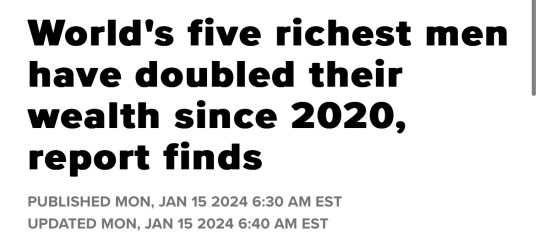#income and wealth
Explore tagged Tumblr posts
Text

Source

Source
#capitalism#eat the rich#tax the rich#news#current events#wealth inequality#income inequality#socioeconomic inequality#the left
34K notes
·
View notes
Text
Monetary Policy and the Evolution of Wealth Disparity - An Assessment Using US Survey of Consumer Finance Data.
This session examines the distributional effects of recent - monetary policies on income and wealth. Using the Federal Reserve Board's Survey of Consumer Finances, the research tracks key subpopulations as monetary policy shifted from conventional interest rates to Quantitative Easing. Employing advanced modeling techniques, the study analyzes volatility and bifurcation in capital gains and incomes among U.S.
Watch the Monetary Policy and the Evolution of Wealth Disparity - An Assessment Using US Survey of Consumer Finance Data!

#Survey of Consumer Finances#income and wealth#monetary policies#Quantitative Easing#interest rates#capital gains#income#united states#wealth disparity#distributional effects#federal reserve bank#consumer finance#monetary policy
0 notes
Text
how to manifest money into your life with asteroid money #7782 ٩(•͈ ꇴ •͈)و ̑̑❀$$$
please do not repost or copy.

In a previous post introducing this money asteroid, I expressed the meaning of what it takes to notice where, how, and what brings in the cash into your life through the birth chart.
It all comes down to the details; how can I manifest money into my life?
Can an asteroid help me to understand how to engage with the value of money energy, and take charge of it in my financial lifestyle?
⋆⛧┈┈┈┈﹤୨♡୧﹥ ┈┈┈┈⛧⋆
Let's break it down; asteroid mony 7782 is the asteroid that holds all aspects of gaining cash, money, deposits, and rules all the ways of having multiple numbers in the bank account.
When looking to the birth chart, the sign, degree, aspects, and house position points to where you're able to make money in your life.
Here are some quick tips involving the elements of the signs that are involved with this asteroid:
Asteroid Mony in the Fire Signs (Aries ♈︎, Leo ♌︎ , Sagittarius) may make money on the go; they are able to greet their finances within moments, with impulsivity, and may take on various different jobs or hobbies that can bring them to the bag with their passions, phases, or hobbies. Involving in jobs or events that have to do with travel, trying new risky situations, or involving shock value into their passions can invite monetary opportunities.
Asteroid Mony in the Water Signs (Cancer ♋︎ , Scorpio, Pisces ♓︎ ♓︎) are able to to use their emotional forms of expression and outlook on possible spell work to bring in money for needs, wants, and desires for caretaking. It is important these signs have money, because everything is a temptation for them.
Asteroid Mony in the Earth ⊕ Signs (Taurus ♉︎, Virgo ♍︎, Capricorn) are able to use long standing , stable, and long term connections/networks that can bring in cash steadily over time. When they are more engaged to the real world and off the internet, they can find themselves making money that can build into community over time.
Asteroid Mony in the Air Signs (Gemini ♊︎, Libra ♎︎ , Aquarius ♒︎) have to engage with the collective through the digital, technical, and online based communities in order to bring in the money. Being a figure that can inspire others through new ideas, discussion, taking in new forms of inspiration in art, and engaging with research of the world can help them to gain opportunities to the big dollars.
#asteroid mony#asteroid astrology#money#astrology signs#taurus#aries#virgo#libra#astrology#pisces#capricorn#aquarius#wealth#income#invest#opportunities
216 notes
·
View notes
Text
Canada is in deep crisis. It’s unfashionable in centrist circles to say so, but it’s true. The country is literally on fire and facing extraordinary and growing threats from climate change. It is staring down rising extremism, creeping toxic polarization, and low trust. Wealth inequality is on the rise. Its federal system is showing cracks, particularly when it comes to the relationship between Alberta and the national government. Oligopolies and monopolies run wild, exploiting consumers.
There are plenty of other problems too. But of the lot, the confluence of a few major challenges scream, House of cards coming down! Those are the country’s housing crisis, consumer debt, and high — and potentially rising — interest rates. Taken together, they paint a picture of working people staring down lives they can’t afford in the day-to-day. This hellish scenario persists, no matter how hard people work, and no matter how rigidly they follow the rules of the game — rules they were told are fair and just.
Full article
Tagging: @politicsofcanada
#cdnpoli#canada#canadian politics#canadian news#canadian#climate change#climate crisis#wealth inequality#wealth gap#income inequality#right wing extremism#housing crisis
1K notes
·
View notes
Text
{ MASTERPOST } Everything You Need to Know about Repairing Our Busted-Ass World
On poverty:
Starting from nothing
How To Start at Rock Bottom: Welfare Programs and the Social Safety Net
How to Save for Retirement When You Make Less Than $30,000 a Year
Ask the Bitches: “Is It Too Late to Get My Financial Shit Together?“
Understanding why people are poor
It’s More Expensive to Be Poor Than to Be Rich
Why Are Poor People Poor and Rich People Rich?
On Financial Discipline, Generational Poverty, and Marshmallows
Bitchtastic Book Review: Hand to Mouth by Linda Tirado
Is Gentrification Just Artisanal, Small-Batch Displacement of the Poor?
Coronavirus Reveals America’s Pre-existing Conditions, Part 1: Healthcare, Housing, and Labor Rights
Developing compassion for poor people
The Latte Factor, Poor Shaming, and Economic Compassion
Ask the Bitches: “How Do I Stop Myself from Judging Homeless People?“
The Subjectivity of Wealth, Or: Don’t Tell Me What’s Expensive
A Little Princess: Intersectional Feminist Masterpiece?
If You Can’t Afford to Tip 20%, You Can’t Afford to Dine Out
Correcting income inequality
1 Easy Way All Allies Can Help Close the Gender and Racial Pay Gap
One Reason Women Make Less Money? They’re Afraid of Being Raped and Killed.
Raising the Minimum Wage Would Make All Our Lives Better
Are Unions Good or Bad?
On intersectional social issues:
Reproductive rights
On Pulling Weeds and Fighting Back: How (and Why) to Protect Abortion Rights
How To Get an Abortion
Blood Money: Menstrual Products for Surviving Your Period While Poor
You Don’t Have to Have Kids
Gender equality
1 Easy Way All Allies Can Help Close the Gender and Racial Pay Gap
The Pink Tax, Or: How I Learned to Love Smelling Like “Bearglove”
Our Single Best Piece of Advice for Women (and Men) on International Women’s Day
Bitchtastic Book Review: The Feminist Financial Handbook by Brynne Conroy
Sexual Harassment: How to Identify and Fight It in the Workplace
Queer issues
Queer Finance 101: Ten Ways That Sexual and Gender Identity Affect Finances
Leaving Home before 18: A Practical Guide for Cast-Offs, Runaways, and Everybody in Between
Racial justice
The Financial Advantages of Being White
Woke at Work: How to Inject Your Values into Your Boring, Lame-Ass Job
The New Jim Crow, by Michelle Alexander: A Bitchtastic Book Review
Something Is Wrong in Personal Finance. Here’s How To Make It More Inclusive.
The Biggest Threat to Black Wealth Is White Terrorism
Coronavirus Reveals America’s Pre-existing Conditions, Part 2: Racial and Gender Inequality
10 Rad Black Money Experts to Follow Right the Hell Now
Youth issues
What We Talk About When We Talk About Student Loans
The Ugly Truth About Unpaid Internships
Ask the Bitches: “I Just Turned 18 and My Parents Are Kicking Me Out. How Do I Brace Myself?”
Identifying and combatting abuse
When Money is the Weapon: Understanding Intimate Partner Financial Abuse
Are You Working on the Next Fyre Festival?: Identifying a Toxic Workplace
Ask the Bitches: “How Do I Say ‘No’ When a Loved One Asks for Money… Again?”
Ask the Bitches: I Was Guilted Into Caring for a Sick, Abusive Parent. Now What?
On mental health:
Understanding mental health issues
How Mental Health Affects Your Finances
Stop Recommending Therapy Like It’s a Magic Bean That’ll Grow Me a Beanstalk to Neurotypicaltown
Bitchtastic Book Review: Kurt Vonnegut’s Galapagos and Your Big Brain
Ask the Bitches: “How Do I Protect My Own Mental Health While Still Helping Others?”
Coping with mental health issues
{ MASTERPOST } Everything You Need to Know about Self-Care
My 25 Secrets to Successfully Working from Home with ADHD
Our Master List of 100% Free Mental Health Self-Care Tactics
On saving the planet:
Changing the system
Don’t Boo, Vote: If You Don’t Vote, No One Can Hear You Scream
Ethical Consumption: How to Pollute the Planet and Exploit Labor Slightly Less
The Anti-Consumerist Gift Guide: I Have No Gift to Bring, Pa Rum Pa Pum Pum
Season 1, Episode 4: “Capitalism Is Working for Me. So How Could I Hate It?”
Coronavirus Reveals America’s Pre-existing Conditions, Part 1: Healthcare, Housing, and Labor Rights
Coronavirus Reveals America’s Pre-existing Conditions, Part 2: Racial and Gender Inequality
Shopping smarter
You Deserve Cheap Toilet Paper, You Beautiful Fucking Moon Goddess
You Are above Bottled Water, You Elegant Land Mermaid
Fast Fashion: Why It’s Fucking up the World and How To Avoid It
You Deserve Cheap, Fake Jewelry… Just Like Coco Chanel
6 Proven Tactics for Avoiding Emotional Impulse Spending
Join the Bitches on Patreon
#poverty#economics#income inequality#wealth inequality#capitalism#working class#labor rights#workers rights#frugal#personal finance#financial literacy#consumerism#environmentalism
562 notes
·
View notes
Text
Big thing I’ve got from my study of disability in the early modern period in Britain, including dissertation research?
Poor relief that gives money out to the poorest people is probably the most benefit per amount of money, but it’s *massively*, *massively* resented by wealthier people. Not only because it’s redistribution of wealth, given it was usually raised by local taxation, but because it takes both control and opportunities to benefit from them.
The big thing money gives is options, choice, and freedom. Wealthier people value having that and massively resent poorer people having it. They much prefer giving charity to paying their taxes because a) giving charity lets them keep control of the money, even at a remove, and b) they usually find a way to benefit more directly from it.
This is basically why we have the current social security systems we have, where so much more is spent on control and policing of the behaviour of poor and disabled people than actually helping. Universal benefits were popular when the systems were set up for a variety of reasons, including reducing resentment by wealthier people, but largely because means-testing is *more expensive* and *less efficient*than universal benefits.
Wealthier people screaming for more means-testing are doing so because they prefer to have more money spent on tormenting people who are struggling with the conditions that those wealthier people create and maintain because it benefits them than that money actually reaching them.
That’s not how they parse it in their heads, I’m sure, but it *is* the reality of the situation.
#disabled#disability#disableism#ableism#social security#social safety net#wealth redistribution#social control#charity#universal benefits#universal basic income
188 notes
·
View notes
Text




Passive Income Princess Affirmations 💲
#money#money affirmations#affirmation#affirmations#abundance affirmations#abundance#feminine#women#black women#feminine energy#divine feminine#feminine abundance#feminine affirmations#income#abundant#positive affirmations#i am affirmations#luxury#rich#wealth#wealthy girl#wealthy woman#rich girl era#rich girl#attract money#passive income#passive income affirmations#passive income princess#class#beauty
171 notes
·
View notes
Note

This is my first fanart of Tomiko in Paint Tool Sai, and the previous one was made in Clip Studio. I hope you like it! I really love Tomiko, and I hope I can draw your OC more often. ☆☆☆
OHHHHHH SHE’S SO COOL WHAT THE HECK????? I love the shape you gave her hair! That style looks really good on her!💖
thank you thank you THANK YOU!!!!!
46 notes
·
View notes
Text


#homelessness#social mobility#wealth gap#media manipulation#millionaire#economic disparity#income inequality#class consciousness#working class#brainwashing#class status#social inequality#wealth distribution#billionaire#social stratification#economic mobility
160 notes
·
View notes
Text

Source


Source
#capitalism#workers#workers rights#working class#income inequality#wealth inequality#mass news media#news#current events
23K notes
·
View notes
Note
If you don’t mind sharing, since you don’t work for a zoo what is your job situation like? Making a living while working at a definitely zoo seems tricky. Is your main income zoology/animal related or is that more of a side thing?
Sincerely,
- a curious zoology student
I have a (mostly) unrelated jobjob - I’ve never actually been affiliated with a single facility, unless you count college internships before I started this blog. I freelance, working as a science media fact-checker and taking paid research contracts occasionally. I do work on a lot of animal / biology related fact-check content, but it’s not my entire scope of work. I also have the privilege of having family assistance, as I have chronic health issues that interfere with the normative 9-5 grind.
Everything I do in terms of blog writing/research, zoo industry research and publication, and photography is unpaid and pretty much a hobby at this point.
Prior to the pandemic I was trying to find funding for the intra-industry research and public-facing outreach I was doing, but there was never any money for it. (The industry is very used to expecting labor from young women for free. There was and is a lot of interest in the work I do, but the number of people/orgs that have ever provided compensation or financial support is in the single digits). The pandemic actually gave me the chance to pivot to focusing on professional fact-checking.
The only funding I get for any of this work is through a somewhat defunct Patreon I set up years ago when I was trying to make this blog / scicomm a full time gig. I’m terrible at updating it, and I’m conflicted enough about that to have been considering deleting it entirely. (For those of you who have stuck it out despite the radio silence, you’re incredible. You’ve facilitated the donation of my time to write a really cool paper with a zoo disaster response org, which will hopefully get through peer review soon).
To make something like this blog and everything else I do in the field actually financially sustainable, I’d need to fundraise and market more. The thing about a fact-checking career, though, is that it’s reinforced the need to make sure everything I write/say publicly is completely and 100% correct - because that level of rigor is what supports my professional reputation! Which means I’m slow to produce research and reticent to talk about it before it’s finished. My work comes out all the better for it, but it doesn’t fit into a content model that produces revenue.
So yeah, all of this is a side thing that I fit in around my paid work and my health. Because sometimes I just need to go see a tiger and smell an elephant, y’know?
#personal information#zoo job almost always require multiple incomes or family support#or generational wealth#otherwise you live in poverty#I am on a very non traditional industry path and it definitely does not pay either#but it’s a passion project
153 notes
·
View notes
Text





KASUGA ICHIBAN AND ERIC TOMIZAWA | Like a Dragon: Infinite Wealth
#kasuga ichiban#ichiban kasuga#eric tomizawa#gifs#gamingedit#b does gifs#lad infinite wealth#like a dragon infinite wealth#yakuza 8#this was so funny#lost a bit of the context bc i didnt this to be a million gifs long though#kiryu and ichiban are acting like it's just another tuesday and tomizawa is over here like 'i almost got shot you guys wtf'#spoiler tags incoming:#spoilers#yakuza spoilers#like a dragon spoilers#yakuza 8 spoilers#lad infinite wealth spoilers#like a dragon infinite wealth spoilers#long post
315 notes
·
View notes
Text
« For ages, Democratic leaders have tried to have it both ways, calling for marginal improvements to the tax code but shying away from anything that might repel the corporate interests that are also in their coalition. But, at some point, the worsening suffering of tens of millions of workers must persuade them to take the risk.
And — who knows? — maybe if Democrats take that risk, it will free them, and all of us, from the dreary cycle of the past two decades in which frustrated voters turn from one party to the other and then back again, never finding the change they are seeking. And then, for the first time in decades, maybe working people will again vote reliably Democratic, because Democrats will have restored their working-class identity. »
— Dana Milbank at the Washington Post. (archived)
Democrats need to declare war on greed.
Some people have a pathological obsession with the accumulation of wealth which is hurting almost everybody else. These robber barons, mostly in tech, make their late 19th century counterparts seem like Buddhist monks. It's no longer enough to be a mere billionaire, the mega-greedy now aspire to become multi-billionaires or even trillionaires.
It's only when income inequality is reduced that we can get back to something approximating the post-WWII prosperity.
#democrats#war on greed#greed#income inequality#billionaires#oligarchs#excessive wealth#dana milbank
60 notes
·
View notes
Text
rewatching an episode of season one of merlin right now, i have a lot of thoughts (arthur legit looks so young it’s messing with my mind realizing how much the characters grow over the seasons and oh my lordy merlin used to be so pure, so trusting, so naive *ugh*) but one thing that just popped into my head: how small Camelot looks.
this is probably due to budget reasons, but the fact that random people can show up and demand an audience with uther or appear mysteriously and meet with a prince, it just makes me wonder what that must have been like for merlin both during his time in camelot and after
we’re talking a kingdom’s whose golden age was in an era of petty states and kings, a few centuries after the fall of the roman empire. merlin fics sometimes bring up how popular merlin is among the people of camelot. it highlights the unspoken notion that camelot and its nobles and royals aree within degrees of separation.
the world, after arthur’s death, must have gotten so frightfully big for merlin. i just think, what if merlin had served arthur or another such king in a later era when the size of the kingdom was so much larger? remove the feudalistic background, if that is what they were going for in the series, and who is merlin? its for that reason that i love the joke that merlin would lowkey be a monarchist because yeah, merlin lived an early era of kings where royals could be in such close proximity and held to the standards of their people.
#merlin#bbc merlin#arthur pendragon#merlin bbc#merthur#king arthur#merlin emrys#bbc merthur#incoming headcanon: camelot was a small but mighty kingdom that succeeded in centralizing power within the region#after centuries of destabilization in the aftermath of the fall of the roman empire#the pendragon’s united the region#brought great wealth and respect over the lands#like imagine if this is why the purge succeeded#or maybe this is me trying to make history out of a fictional work
162 notes
·
View notes
Text
It may come as no surprise, but Canada's 100 highest-paid CEOs raked in even more dough in 2022, making a staggering 246 times more than the average Canadian worker. This is according to a new report released Tuesday by the Canadian Center for Policy Alternatives (CCPA), which noted that the average pay of Canada's top CEOs jumped from $14.3 million in 2021 to $14.9 million– a new all-time high. This works out to an average raise of about $623,000 or 4.4 per cent in a year. As for the regular Canadian worker, they received an average raise of $1,800 (3 per cent) from $58,800 in 2021 to $60,600 in 2022.
Continue Reading
Tagging @politicsofcanada
159 notes
·
View notes
Text

Overkill. http://Newsday.com/matt :: Matt Davies
* * * *
LETTERS FROM AN AMERICAN
November 13, 2024
Heather Cox Richardson
Nov 14, 2024
Republican senators today elected John Thune of South Dakota to be the next Senate majority leader. Trump and MAGA Republicans had put a great deal of pressure on the senators to back Florida senator Rick Scott, but he marshaled fewer votes than either Thune or John Cornyn of Texas, both of whom were seen as establishment figures in the mold of the Republican senators’ current leader, Mitch McConnell of Kentucky.
Scott lost on the first vote. The fact that the vote was secret likely helped Thune’s candidacy. Senators could vote without fear of retaliation.
The rift between the pre-2016 leaders of the Republican Party and the MAGA Republicans is still obvious, and Trump’s reliance on Elon Musk and his stated goal of deconstructing the American government could make it wider.
Republican establishment leaders have always wanted to dismantle the New Deal state that began under Democratic president Franklin Delano Roosevelt and continued under Republican president Dwight D. Eisenhower and presidents of both parties until 1981. But they have never wanted to dismantle the rule of law on which the United States is founded or the international rules-based order on which foreign trade depends. Aside from moral and intellectual principles, the rule of law is the foundation on which the security of property rests: there is a reason that foreign oligarchs park their money in democracies. And it is the international rules-based order that protects the freedom of the seas on which the movement of container ships, for example, depends.
Trump has made it clear that his goal for a second term is to toss overboard the rule of law and the international rules-based order, instead turning the U.S. government into a vehicle for his own revenge and forging individual alliances with autocratic rulers like Russian president Vladimir Putin.
He has begun moving to put into power individuals whose qualifications are their willingness to do as Trump demands, like New York representative Elise Stefanik, whom he has tapped to be the U.S. ambassador to the United Nations, or Florida senator Marco Rubio, who Trump said today would be his nominee for secretary of state.
Alongside his choice of loyalists who will do as he says, Trump has also tapped people who will push his war on his cultural enemies forward, like anti-immigrant ideologue Stephen Miller, who will become his deputy chief of staff and a homeland security advisor. Today, Trump added to that list by saying he plans to nominate Florida representative Matt Gaetz, who has been an attack dog for Trump, to become attorney general.
Trump’s statement tapping Gaetz for attorney general came after Senate Republicans rejected Scott, and appears to be a deliberate challenge to Republican senators that they get in line. In his announcement, Trump highlighted that Gaetz had played “a key role in defeating the Russia, Russia, Russia Hoax.”
But establishment Republican leaders understand that some of our core institutions cannot survive MAGA’s desire to turn the government into a vehicle for culture war vengeance.
Gaetz is a deeply problematic pick for AG. A report from the House Ethics Committee investigating allegations of drug use and sex with a minor was due to be released in days. Although he was reelected just last week, Gaetz resigned immediately after Trump said he would nominate him, thus short-circuiting the release of the report. Last year, Republican senator Markwayne Mullin of Oklahoma told CNN that “we had all seen the videos he was showing on the House floor, that all of us had walked away, of the girls that he had slept with. He would brag about how he would crush [erectile dysfunction] medicine and chase it with an energy drink so he could go all night."
While South Carolina senator Lindsey Graham said he would be willing to agree to the appointment, other Republican senators drew a line. “I was shocked by the announcement —that shows why the advise and consent process is so important,” Senator Susan Collins (R-ME) said. “I’m sure that there will be a lot of questions raised at his hearing.” Senator Lisa Murkowski (R-AK) was blunt: “I don’t think he’s a serious candidate.”
If the idea of putting Gaetz in charge of the country’s laws alarmed Republicans concerned about domestic affairs, Trump’s pick of the inexperienced and extremist Fox & Friends host Pete Hegseth to take over the Department of Defense was a clarion call for anyone concerned about perpetuating the global strength of the U.S. The secretary of defense oversees a budget of more than $800 billion and about 1.3 million active-duty troops, with another 1.4 million in the National Guard and employed in Reserves and civilian positions.
The secretary of defense also has access to the nuclear command-and-control procedure. Over his nomination, too, Republican senators expressed concern.
While Trump is claiming a mandate to do as he wishes with the government, Republicans interested in their own political future are likely noting that he actually won the election by a smaller margin than President Joe Biden won in 2020, despite a global rejection of incumbents this year. And he won not by picking up large numbers of new voters—it appears he lost voters—but because Democratic voters of color dropped out, perhaps reflecting the new voter suppression laws put into place since 2021.
Then, too, Trump remains old and mentally slipping, and he is increasingly isolated as people fight over the power he has brought within their grasp. Today his wife, Melania, declined the traditional invitation from First Lady Jill Biden for tea at the White House and suggested she will not be returning to the presidential mansion with her husband. It is not clear either that Trump will be able to control the scrabbling for power over the party by those he has brought into the executive branch, or that he has much to offer elected Republicans who no longer need his voters, suggesting that Congress could reassert its power.
Falling into line behind Trump at this point is not necessarily a good move for a Republican interested in a future political career.
Today the Republicans are projected to take control of the House of Representatives, giving the party control of the House, the Senate, and the presidency, as well as the Supreme Court. But as the downballot races last week show, MAGA policies remain unpopular, and the Republican margin in the House will be small. In the last Congress, MAGA loyalists were unable to get the votes they needed from other Republicans to impose Trump’s culture war policies, creating gridlock and a deeply divided Republican conference.
The gulf between Trump’s promises to slash the government and voters’ actual support for government programs is not going to make the Republicans’ job easier. Conservative pundit George Will wrote today that “the world’s richest person is about to receive a free public education,” suggesting Elon Musk, who has emerged as the shadow president, will find his plans to cut the government difficult to enact as elected officials reject cuts to programs their constituents like.
Musk’s vow to cut “at least” $2 trillion from federal spending, Will notes, will run up against reality in a hurry. Of the $6.75 trillion fiscal 2024 spending, debt service makes up 13.1%; defense—which Trump wants to increase—is 12.9%. Entitlements, primarily Social Security and Medicare, account for 34.6%, and while the Republican Study Group has called for cuts to them, Trump said during the campaign, at least, that they would not be cut.
So Musk has said he would cut about 30% of the total budget from about 40% of it. Will points out that Trump is hardly the first president to vow dramatic cuts. Notably, Ronald Reagan appointed J. Peter Grace, an entrepreneur, to make government “more responsive to the wishes of the people” after voters had elected Reagan on a platform of cutting government. Grace’s commission made 2,478 recommendations but quickly found that every lawmaker liked cuts to someone else’s district but not their own.
Will notes that a possible outcome of the Trump chaos might be to check the modern movement toward executive power, inducing Congress to recapture some of the power it has ceded to the president in order to restore the stability businessmen prefer.
Franklin Delano Roosevelt was himself a wealthy man, and in the 1930s he tried to explain to angry critics on the right that his efforts to address the nation’s inequalities were not an attack on American capitalism, but rather an attempt to save it from the communism or fascism that would destroy the rule of law.
“I want to save our system, the capitalistic system,” FDR wrote to a friend in 1935. “[T]o save it is to give some heed to world thought of today.”
The protections of the system FDR ushered in—the banking and equities regulation that killed crony finance, for example—are now under attack by the very sort of movement he warned against. Whether today’s lawmakers are as willing as their predecessors were to stand against that movement remains unclear, especially as Trump tries to bring lawmakers to heel, but Thune’s victory in the Senate today and the widespread Republican outrage over Trump’s appointment of Gaetz and Hegseth are hopeful signs.
LETTERS FROM AN AMERICAN
HEATHER COX RICHARDSON
#Matt Davies#Newsday#political cartoons#Heather Cox Richardson#Letters From An American#the new Cabinet#Matt Gaetz#FDR#history#the capitalistic system#wealth#MAGA loyalists#FOX and friends#incoming
46 notes
·
View notes